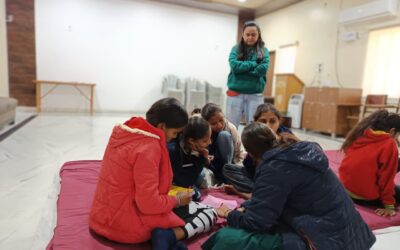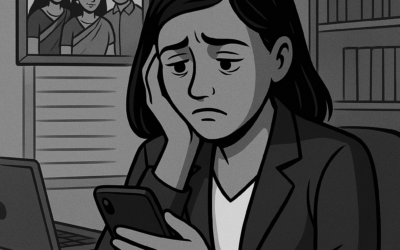It was a sudden Sunday morning when I received a call from my host project’s state head, informing me that I was needed in Maheshwar. At that moment, I was in my room in Indore, planning for Monday, when this unexpected shift happened. My first thought was, “Arey yaar, phirse?” But then, almost immediately, I shrugged and thought, “Thik hai, chal lenge. Mazza aayega!”
I had a lot of chores and work-related tasks to finish before leaving. By the time I wrapped everything up and packed my bags, it was already midnight. I decided to pack light, thinking, “Ek hafte ka hi toh baat hai, ho jaayega.” But little did I know …
The Arrival In Maheshwar
When I reached Maheshwar after a three-hour journey, I was looking for a familiar face—someone I knew—especially my co-fellow, Ayushi. But then I found out she was on leave. Yet, to my surprise, I didn’t feel lonely or awkward. Instead, I was greeted warmly by two field staff members who immediately invited me to have lunch with them. We sat together, sharing food and stories. They asked about me—where I was from, what I did—and I found myself laughing and talking as if I had known them for a long time. There was no hesitation, no formality, just a deep sense of comfort.
The next day was a holiday, so we decided to explore Maheshwar Fort like tourists. The experience was refreshing—a break from the intensity of work. The calm waters of the Narmada, the historic grandeur of the fort, and the lively streets of Maheshwar made the day feel special. It was a much-needed pause before diving into the fieldwork.
Stepping Into The Field
When I went to the field the next day, it didn’t feel new. The women welcomed me as if they had known me forever. They treated me like “bahar se aayi hui didi” (a sister visiting from outside), and this warmth set the tone for my entire stay. As part of my work, I started forming a new model in my head. My focus was on increasing liaisons with the government, but before that, I knew that the first step to empowering women was making them realize that they already had a lot of capabilities—they just needed a little push.
I worked on the ground with this in mind, encouraging women from even the most remote villages to come to the office at least once a month. Slowly, I started seeing the impact. Women were stepping out of their comfort zones and engaging in discussions about their rights. My days felt productive and fulfilling.
When Maheshwar Became Home
Beyond work, what made Maheshwar special was the people. One such moment was when I was in the field with a federation staff member. I was feeling weak, feverish, and exhausted. A woman noticed and immediately asked, “Aapka tabiyat kharab hai kya?” I nodded. She told me to sit and quickly brought me warm water. I hesitated, saying, “Nahi, theek hai.” But she and her children insisted, “Aap sharmao mat. Aap humari sister jaisi ho.”
That moment took my heart. It was such a simple act, yet it held so much love. As if that wasn’t enough, they invited me for dinner that night. “Aaj machli banayi hai. Aap toh Bengal se ho, ghar nahi miss karoge!” I felt an overwhelming sense of belonging. These people had only met me once, yet they treated me like family. That evening, they even came to pick me up from the office for dinner. We sat together, eating, laughing at jokes, and sharing stories about our cultures and rituals. It didn’t feel like I was in a different state, 1500 kilometers away from home. It felt like home itself.
The Strength Of Women In Maheshwar
One Sunday afternoon, even though my body didn’t feel like working, I went to Karondia village for a gender training session. Midway through the session, the women noticed I was speaking for too long and suggested a break. Within minutes, they organized an informal, “Chai pe charcha.” One woman brought tea, another brought laddoos, someone got snack, and another brought roasted corn. We sat in a circle, and they started asking about me—where I was from, my work, my family. The conversation felt effortless, like I was sitting with my own people. Their hospitality, their warmth, and their curiosity made me feel incredibly connected.
Bumps Along The Way
Not every moment in Maheshwar was lighthearted. Some stories shook me. One evening, Ayushi and I were returning from the field when we met a young girl living near our office. She was about to get married in two days. She was just 21. She recognized Ayushi and, seeing me for the first time, hesitated for a moment before speaking. Then, suddenly, she said,
“Didi, life kitna cruel hota hai na? Mujhe shaadi nahi karni. Mujhe padhna hai. Doctor banna hai. Par mummy-papa allow nahi kar rahe hain.”
Her words hit both of us hard. Here was a girl who had dreams, aspirations, and the potential to build a future, yet she was being forced into marriage. We tried everything in our power to stop it. We spoke to her parents, explained the consequences, and sought help from community members. But in the end, we failed. Her marriage happened. That night, I couldn’t sleep. I kept thinking about the privilege I had—the freedom to choose, the support of my family, and the opportunities that many young girls like her would never have.
Where Is Home?
Maheshwar was not just a location I am working in—it became a feeling, an emotion. It was the people who made it home. The women who welcomed me like a daughter. The children who treated me like an elder sister. The families who invited me for meals, not out of formality, but because they genuinely cared. I went there for work, but I left with stories, connections, and a deep sense of belonging.
Maheshwar was not just about gender projects, government liaisons, or training sessions. It was about shared meals, unexpected friendships, and a community that embraced me without hesitation. It reminded me that home is not just where you are from. Home is where you are welcomed with open arms. And in Maheshwar, I was not just working. I was home.
Here is a link to an insightful Ted Talk by Pico Iyer On Where Is Home?




0 Comments